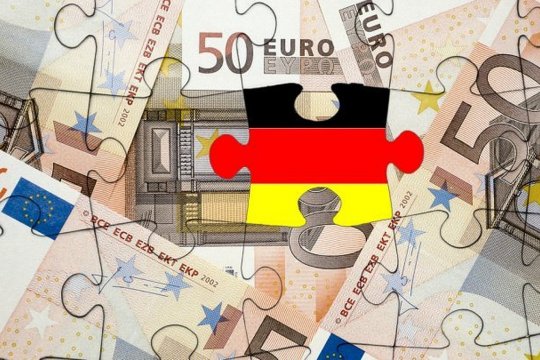"One of Germany’s most acclaimed experts" in economic risk analysis, Marcus Krall, "predicts the collapse of the German banking system and the eurozone by the end of 2020." Krall describes the euro as an “erroneous structure,” whose existence is maintained for political reasons. According to Krall, the euro has a negative impact on Germany’s competitiveness and “weakens the country's banking system”. Most eurozone countries would "have gone bankrupt" long ago if the European Central Bank did not support them by lowering interest rates. “At the end of next year, Europe may face a dramatic decline in the availability of loans.” There will be massive bankruptcies of businesses, and the unemployment rate will soar. In an attempt to save the situation, the ECB will resort to emissions, which, in turn, will provoke a leap in inflation and "loss of savings not only of the Germans, but also of everyone who invested in euros." The crisis in the European economy will undermine political support for the euro, “and countries will return to their national currencies.” [i] It sounds threatening, but let's try to look at the details.
The slowdown of the German economy has been in place for several years. According to the returns of the year 2018, the GDP growth dropped to its lowest in the past 5 years and amounted to 1.5%, which is a decline of 0.7 compared to 2017. The largest EU economy “narrowly escaped a recession”. In the second quarter of this year, German GDP decreased by 0.1% against the same period the previous year; which, in annual terms, reduced the growth rate to 0.4%. Official forecasts for the results of the current year have been reduced to 0.5% - more than three times, compared with last year’s expectations. By early autumn, forecasts for a further decline in exports amid fears of a general slowdown in the global economy led to more expectations of a further slowdown of the economy. [ii] The government of Angela Merkel, after expressing optimism about growth prospects for the current year, began to acknowledge the problem.
The economy of Germany is to a large extent dependent on exports, and any serious turmoil in international trade will cause Germany more damage than any other EU country. An important factor is the ongoing trade war between the United States and China, which is on the verge of a new escalation. What also creates a negative outlook for the entire European economy is the prospect of Brexit without an agreement between London and Brussels. Finally, the Chinese economy is slowing down, which has caused a decrease in demand for German export products, primarily cars. According to The Financial Times, in the first half of this year, the output in the car-manufacturing industry dropped by 12 percent. Also, the anti-Russian sanctions are hitting “the German farming sector and processing industries; German companies are losing jobs and profit,” - reports Gazeta.ru. Meanwhile, consumer spending and domestic investment continue to grow. Unemployment is at its lowest since the reunification of Germany. Reports of September 9 say that in July German exports rose again by 0.7%, rather than fall, as most observers had expected. Nevertheless, entrepreneurial confidence continues to decline in almost all sectors of the economy [iii]. Thus, the GDP growth rate in the 3rd quarter will make the key factor: in case of a decrease, we will be able to talk about a recession in Germany in the formal sense of the word.
Like most European banks, German comapnies have long been fighting a fierce battle to maintain the profitability of business amid the long-running period of ultra-low interest rates. Meanwhile, bond yields, especially long-term ones, continue to decline throughout Europe. The yield on German government bonds is negative for all securities with a validity term of up to 10 years inclusive. For 30-year bonds, the yield fluctuates around zero. [iv] The rate difference between short-and long-term borrowings - the main source of income for banks under normal conditions – is close to zero. As investors rush in search for safer assets, the forecasts are disappointing: negative rates will persist “for several more years.” [v] Another negative prospect for the German banking system is the de facto negative rates on ECB deposits [vi]. In fact, banks have to pay the Central Bank for keeping their capital in its accounts. The prospect of a new drop in the ECB interest rate in the near future [vii] is causing more anxiety among investors.
The ECB is signaling its willingness to lower interest rates in order to neutralize the slowdown in the entire eurozone. Experts predict that the ECB will either keep rates at the current low level or lower them even more, at least until mid-2020. In these conditions, the German government is likely to resort to tough measures to secure a deficit-free budget, at least in 2019. However, the policy of cutting the state debt could be revised. At the end of this summer, German Finance Ministry officials publicly spoke about a “package of economic incentives” that could be put into effect in the event of a recession in Germany. Depending on the extent of such stimuli, the balanced annual budget policy may be put at risk [viii].
In 20 years, the euro has turned Germany into a key EU economy, critical for the economic stability of the entire union. At the same time, it has become a major factor that cemented the isolation of Germany in Europe. As skeptics had predicted, the admission to the eurozone, despite tough selection criteria, of countries very different from the economic point of view, led to the fact that a deterioration in the global economic situation hits the weakest member countries the hardest. According to critics, "the euro exchange rate is clearly too high for France and Italy (this becomes a blow to their competitiveness), and too low for Germany." During the Eurozone crisis of 2009, there appeared a vicious circle: the dominance of the Federal Republic of Germany's economy in the EU allowed Berlin to dictate its conditions for strict budgetary savings to most of Europe. This, in turn, gave rise to an outbreak of anti-German sentiment in a number of countries on the continent, including Greece and Italy. [ix]
By now, Central Europe has turned into a supplier of semi-finished products and spare parts for German enterprises. The rest of the EU countries are a market for German goods. Simultaneously, Germany is forced to pay for the economic failure of an increasing number of its partners in the eurozone. Thus, the economic power of Germany, while being the backbone of the entire economic system of the EU, has become almost the main threat to the European integration project. Even though the German economy boasts a significant amount of strength, “weak domestic credit performance, the risk of a global trade recession and the slowdown in China” will continue to “push” Germany to recession, - SaxoBank analysts quoted by Gazeta.ru said in the middle of the year. According to the June results, industrial production went down by 5% year-on-year. The ZEW economic sentiment index has reached its lowest level since December 2011 [x]. According to Eurostat, published in early September, the total GDP of the euro area countries grew by only 0.2 percent in the second quarter, which is two times lower against the first three months of this year.
In late August, The Economist made a prediciton that Germany would follow the path of Japan, which has been waging an incessant struggle against the threat of stagnation for decades. Like Japan, present-day Germany is rich, burdened with a large state debt, as well as an aging population. Trends in the German bond market also signal "endless stagnation." Concerns are growing that politicians have “forever” lost their ability to improve the state of the economy. Moreover, the decline in consumer prices “pushes” discount rates yet lower. As a result, many experts believe that Berlin may be faced with the need for a more “self-oriented” policy, at least in the economic sphere.
Meanwhile, considering EU membership criteria, the majority of the eurozone member countries are in no position to take any significant steps in the event of a genuinely unfavorable turn in the global economic situation. The presence of the euro and the "unprecedentedly" high degree of independence of the ECB with its extensive powers put severe restrictions on the possibility of influencing the economy of individual states. In accordance with the current requirements of the eurozone, governments have to either increase taxes or reduce government spending - even if it harms the national economy. Formally, there is a monetary mechanism to counter economic upheavals in a particular eurozone country to minimize their consequences for other participants. From the point of view of abstract macroeconomic indicators, this mechanism has been functioning well up to now. But, judging by what we witnessed in Spain, and then in Greece and Italy, its socio-economic and political costs are extremely high.
Also, the ECB itself is pretty hard-up at the moment. In the spring, it extended the program of preferential lending to the banking sector. However, inflation is steadily below the 2 percent target, and interest rates, as mentioned above, are fluctuating around zero. The government bond retirement program, especially in the case of Germany, is already approaching the limit established by the current legislation. Given the situation, economists fear that in the event of a new economic shock, there may simply be “no room left” for monetary policy measures. According to pessimists, "Europe has already reached this point." Thus, for the first time in the past decade, we can talk about the need to use fiscal stimuli. And it is completely unclear whether the decisions, which are likely to be the result of numerous political and bureaucratic compromises, will prove effective. Thus, the recently announced plans in the fiscal sphere of individual countries indicate, according to economists, the high probability of an increase in the eurozone budget deficit - up to 0.8 percent of its total GDP in 2019, The Economist reports. While the budget deficit keeps growing in Italy and France, Germany does not lose hope for a small economic growth in annual terms. In the absence of a common eurozone budget, “general” fiscal measures can again turn out to be only the arithmetic average of the diverse decisions taken at the national level. Optimists expect fiscal stimuli to add 0.2-0.3 percent to eurozone GDP growth by the end of this year. Yet again, much depends on Germany with its extremely significant “space for maneuver”.
However, Berlin is still in two minds about it, probably, because in the case of fiscal stimulus measures, consensus is important, along with a good coordination of actions of the governments of different countries. Only in this case could fears of stagnation disperse. Finally, the scope of necessary incentive measures requires a high degree of political credibility. Therefore, it cannot be ruled out that an economic recession in Germany could introduce substantial changes to the plans or dates of the transit of the supreme power scheduled for 2021. For Germany it took more than for other European countries to stop resisting the idea of fiscal stimulus for the economy. Now, observers argue whether the German authorities could go too far. In any case, they have yet to agree on such key parameters of the general budget of the eurozone as its size and permissible applications. Meanwhile, as pressure on the European economy keeps growing, a collapse of the eurozone can no longer be ruled out.
At present, there are still chances for Germany to avoid a recession, if not in the technical, then in the practical sense of the word. And even if it starts, the Federal Republic of Germany will enter it with one of the lowest unemployment rates among all countries of the world. By their nature, most factors that push the German economy “down” can be considered temporary. Nevertheless, more and more experts come to the conclusion that the economy of Germany "is balancing on the brink of recession." The banking sector of Germany is busy struggling to maintain business amid zero or negative yield on assets, just like most banks in other countries of the euro area. Every day, it becomes clear that, in order to save the eurozone, the participating countries will have to make the difficult choice between delegating some part of fiscal sovereignty in favor of the hypothetical “common” supranational “finance ministry”, on the one hand, and on the other, going on with their attempts, which are increasingly costly, if not utterly useless in the current conditions, to withstand cyclical fluctuations in the economy with the help of the ECB monetary measures alone.
The opinion of the author may not coincide with the position of the Editorial Board
[i] https://regnum.ru/news/polit/2699386.html
[ii] https://www.bbc.com/news/business-49342012
[iii] https://www.ft.com/content/0e477fae-b383-11e9-8cb2-799a3a8cf37b
[iv] https://www.bloomberg.com/markets/rates-bonds/government-bonds/germany (date of address - 11.09.2019).
[vii] http://www.profinance.ru/news/2019/09/09/bud2-mario-dragi-vstryakhnet-rynki-na-etoj-nedele.html
[viii] https://www.dw.com/en/does-germany-need-a-stimulus-package-to-cope-with-recession/a-50098144
[ix] https://www.foreignaffairs.com/articles/germany/2019-04-02/new-german-question
[x] https://edition.cnn.com/2019/08/14/business/germany-economy-gdp/index.html
read more in our Telegram-channel https://t.me/The_International_Affairs

 10:23 15.09.2019 •
10:23 15.09.2019 •



























